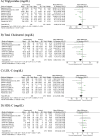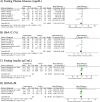The effect of apple cider vinegar on lipid profiles and glycemic parameters: a systematic review and meta-analysis of randomized clinical trials - PubMed (original) (raw)
Meta-Analysis
The effect of apple cider vinegar on lipid profiles and glycemic parameters: a systematic review and meta-analysis of randomized clinical trials
Amir Hadi et al. BMC Complement Med Ther. 2021.
Abstract
Background: Elevated lipid profiles and impaired glucose homeostasis are risk factors for several cardiovascular diseases (CVDs), which, subsequently, represent a leading cause of early mortality, worldwide. The aim of the current study was to conduct a systematic review and meta-analysis of the effect of apple cider vinegar (ACV) on lipid profiles and glycemic parameters in adults.
Methods: A systematic search was conducted in electronic databases, including Medline, Scopus, Cochrane Library, and Web of Knowledge, from database inception to January 2020. All clinical trials which investigated the effect of ACV on lipid profiles and glycemic indicators were included. Studies were excluded if ACV was used in combination with other interventions or when the duration of intervention was < 2 weeks. To account for between-study heterogeneity, we performed meta-analysis using a random-effects model.
Results: Overall, nine studies, including 10 study arms, were included in this meta-analysis. We found that ACV consumption significantly decreased serum total cholesterol (- 6.06 mg/dL; 95% CI: - 10.95, - 1.17; I2: 39%), fasting plasma glucose (- 7.97 mg/dL; 95% CI: - 13.74, - 2.21; I2: 75%), and HbA1C concentrations (- 0.50; 95% CI: - 0.90, - 0.09; I2: 91%). No significant effect of ACV consumption was found on serum LDL-C, HDL-C, fasting insulin concentrations, or HOMA-IR. The stratified analysis revealed a significant reduction of serum TC and TG in a subgroup of patients with type 2 diabetes, those who took ≤15 mL/day of ACV, and those who consumed ACV for > 8-weeks, respectively. Furthermore, ACV consumption significantly decreased FPG levels in a subgroup of studies that administered ACV for > 8-weeks. Further, ACV intake appeared to elicit an increase in FPG and HDL-C concentrations in apparently healthy participants.
Conclusion: We found a significant favorable effect of ACV consumption on FPG and blood lipid levels.
Keywords: Apple cider vinegar; Clinical trials; Glycemic indices; Lipid profiles; Meta-analysis.
Conflict of interest statement
The authors declare no conflict of interest.
Figures
Fig. 1
Flow chart of the process of the study selection
Fig. 2
The meta-analysis results of the effect of apple cider vinegar administration on lipids profiles. Kondo et al. study administrated apple cider vinegar in 2 different dosages which showed as “L” (lower dose) and “H” (higher dose) in figure
Fig. 3
The meta-analysis results of the effect of apple cider vinegar administration on glycemic related factors. Kondo et al. study administrated apple cider vinegar in 2 different dosages which showed as “L” (lower dose) and “H” (higher dose) in figure
Similar articles
- The effects of apple cider vinegar on cardiometabolic risk factors: A systematic review and meta-analysis of clinical trials.
Tehrani SD, Keshani M, Rouhani MH, Moallem SA, Bagherniya M, Sahebkar A. Tehrani SD, et al. Curr Med Chem. 2023 Aug 22. doi: 10.2174/0929867331666230822102021. Online ahead of print. Curr Med Chem. 2023. PMID: 37608660 - Apple cider vinegar attenuates lipid profile in normal and diabetic rats.
Shishehbor F, Mansoori A, Sarkaki AR, Jalali MT, Latifi SM. Shishehbor F, et al. Pak J Biol Sci. 2008 Dec 1;11(23):2634-8. doi: 10.3923/pjbs.2008.2634.2638. Pak J Biol Sci. 2008. PMID: 19630216 - Effects of whey protein on glycemic control and serum lipoproteins in patients with metabolic syndrome and related conditions: a systematic review and meta-analysis of randomized controlled clinical trials.
Amirani E, Milajerdi A, Reiner Ž, Mirzaei H, Mansournia MA, Asemi Z. Amirani E, et al. Lipids Health Dis. 2020 Sep 21;19(1):209. doi: 10.1186/s12944-020-01384-7. Lipids Health Dis. 2020. PMID: 32958070 Free PMC article. - Effect of lifestyle interventions on cardiovascular risk factors among adults without impaired glucose tolerance or diabetes: A systematic review and meta-analysis.
Zhang X, Devlin HM, Smith B, Imperatore G, Thomas W, Lobelo F, Ali MK, Norris K, Gruss S, Bardenheier B, Cho P, Garcia de Quevedo I, Mudaliar U, Jones CD, Durthaler JM, Saaddine J, Geiss LS, Gregg EW. Zhang X, et al. PLoS One. 2017 May 11;12(5):e0176436. doi: 10.1371/journal.pone.0176436. eCollection 2017. PLoS One. 2017. PMID: 28493887 Free PMC article. Review.
Cited by
- Short-Chain Fatty Acids as Bacterial Enterocytes and Therapeutic Target in Diabetes Mellitus Type 2.
Neag MA, Craciun AE, Inceu AI, Burlacu DE, Craciun CI, Buzoianu AD. Neag MA, et al. Biomedicines. 2022 Dec 27;11(1):72. doi: 10.3390/biomedicines11010072. Biomedicines. 2022. PMID: 36672580 Free PMC article. Review. - Mangosteen vinegar from Garcinia mangostana: quality improvement and antioxidant properties.
Suksamran N, Anantawat V, Wattanaarsakit P, Wei C, Rahman MA, Majima HJ, Tangpong J. Suksamran N, et al. Heliyon. 2022 Dec 13;8(12):e11943. doi: 10.1016/j.heliyon.2022.e11943. eCollection 2022 Dec. Heliyon. 2022. PMID: 36590574 Free PMC article. - Apple cider vinegar for weight management in Lebanese adolescents and young adults with overweight and obesity: a randomised, double-blind, placebo-controlled study.
Abou-Khalil R, Andary J, El-Hayek E. Abou-Khalil R, et al. BMJ Nutr Prev Health. 2024 Mar 12;7(1):61-67. doi: 10.1136/bmjnph-2023-000823. eCollection 2024. BMJ Nutr Prev Health. 2024. PMID: 38966098 Free PMC article. - Novel Coconut Vinegar Attenuates Hepatic and Vascular Oxidative Stress in Rats Fed a High-Cholesterol Diet.
Malakul W, Seenak P, Jumroon N, Arikit S, Kumphune S, Nernpermpisooth N. Malakul W, et al. Front Nutr. 2022 Mar 9;9:835278. doi: 10.3389/fnut.2022.835278. eCollection 2022. Front Nutr. 2022. PMID: 35356733 Free PMC article. - Therapeutic Potentials of Reducing Liver Fat in Non-Alcoholic Fatty Liver Disease: Close Association with Type 2 Diabetes.
Tsamos G, Vasdeki D, Koufakis T, Michou V, Makedou K, Tzimagiorgis G. Tsamos G, et al. Metabolites. 2023 Apr 4;13(4):517. doi: 10.3390/metabo13040517. Metabolites. 2023. PMID: 37110175 Free PMC article. Review.
References
- Bashiri R, Ghadiri-Anari A, Hekmatimoghadam H, Dehghani A, Najarzadeh A. The effect of apple vinegar on lipid profiles and anthropometric indices in type 2 diabetes patients with dyslipidemia: a randomized clinical trial. SSU J. 2014;22(5):1543–1553.
Publication types
MeSH terms
Substances
LinkOut - more resources
Full Text Sources
Medical
Miscellaneous


